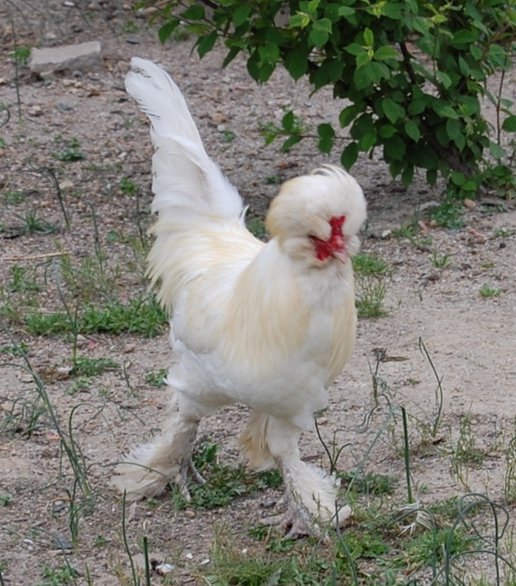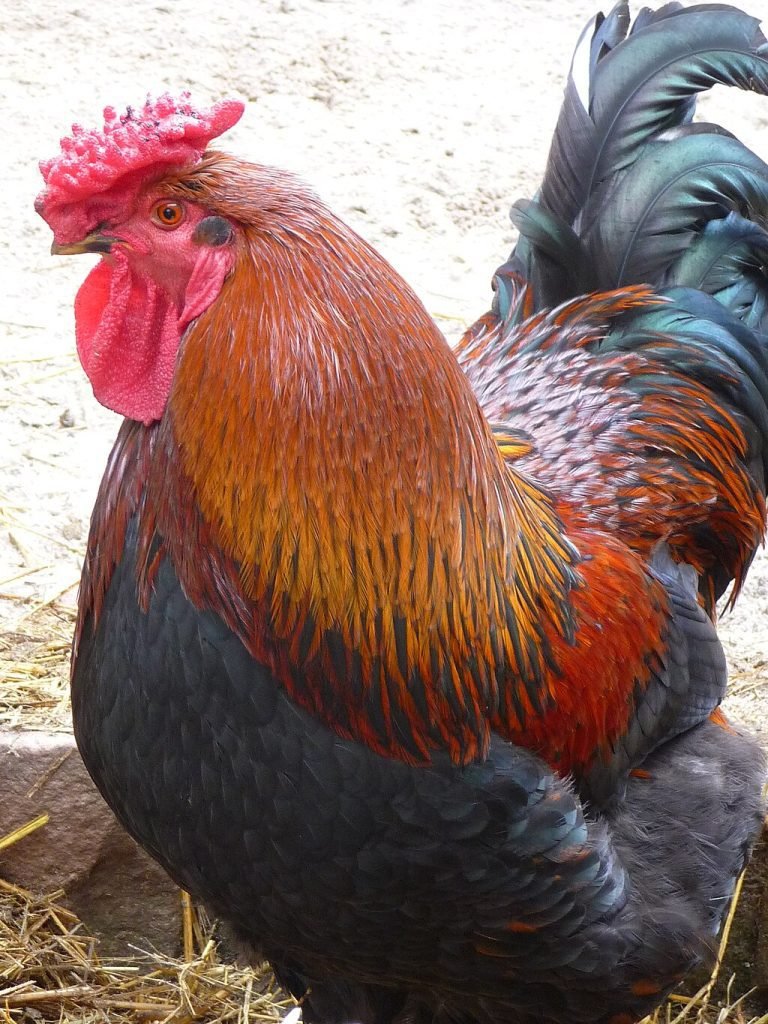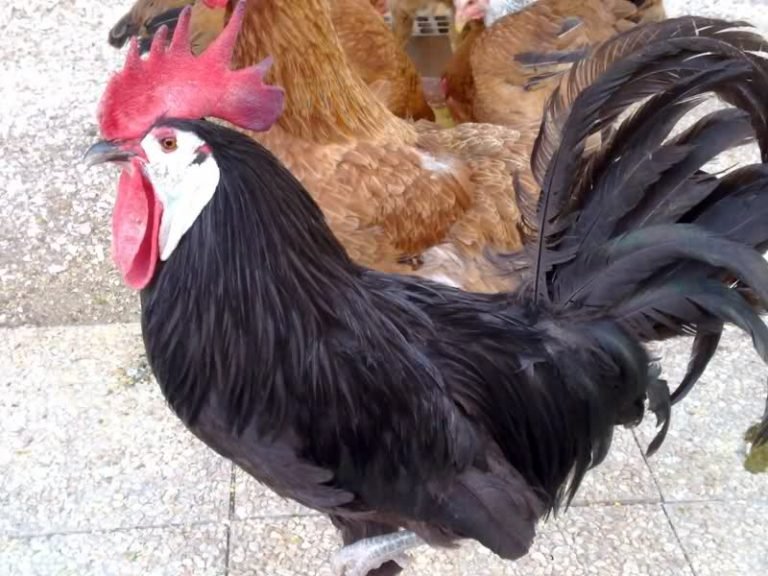The Sultan chicken breed is known for its striking appearance with unique feather patterns and a distinct crest on its head. These gorgeous birds are a rare breed that originated in Turkey and are now popular among poultry enthusiasts for their ornamental value and gentle temperament.
Their elegant and regal appearance makes them a favorite among backyard chicken keepers, as well as in exhibitions and shows. Sultan chickens are not typically raised for meat or egg production, but rather for their captivating beauty and as a conversation piece in the poultry community.
With their stunning plumage and graceful demeanor, Sultan chickens are a delight to observe and a fascinating addition to any flock.
History
The Sultan chicken breed has a rich history, with origins in the Ottoman Empire. Known for their unique appearance and regal demeanor, Sultans are prized for their ornamental qualities rather than meat or egg production. These beautiful birds have captivated poultry enthusiasts for centuries.
The Sultan chicken breed is a fascinating and unique breed that has a rich history dating back centuries. This breed, also known as the Serai Taook, is known for its distinctive appearance and elegant plumage. In this section, we will delve into the history of the Sultan chicken breed and explore its origins, characteristics, and role in poultry farming.
- Sultans originated in the Ottoman Empire and were highly prized for their ornamental qualities.
- They were first introduced to Europe in the 18th century and subsequently gained popularity as ornamental birds.
- Sultans were particularly favored by Turkish sultans and Ottoman nobility, which is how they earned their name.
- The breed was first imported to England in the mid-19th century, where it gained recognition for its striking appearance.

General Characteristics
The Sultan Chicken Breed is known for its striking appearance with its ornate plumage and elegant stance. It is a small breed with a calm and gentle temperament, making it a popular choice for backyard poultry enthusiasts.
The Sultan Chicken breed is known for its distinct appearance and gentle nature. Here are some key features that make this breed unique:
- Plumage: The Sultan Chicken is easily recognizable by its lustrous, fluffy plumage. The feathers are abundant and long, covering the entire body, including the legs. This gives the bird a regal and majestic appearance.
- Crested head: One of the most prominent characteristics of the Sultan Chicken is its large, flamboyant crest on top of its head. The crest consists of a cluster of feathers that resemble a crown, making it a striking breed.
- Feathered feet: Unlike many other chicken breeds, Sultans have feathered feet. This means that their legs and toes are covered with abundant feathers, giving them a unique appearance. The plumage on the feet can be either white or black, depending on the variety of Sultan Chicken.
- Gentle temperament: Sultans are known for their friendly and docile nature. They are not aggressive and can be easily handled, making them an excellent choice for backyard enthusiasts or families with children.
- Non-prolific layers: While Sultans are not known for their egg production, they can lay a reasonable number of small white eggs throughout the year. However, if you are primarily seeking a breed for egg production, the Sultan may not be the best choice.
- Exhibition and ornamental value: Due to their unique appearance, Sultans are often kept for exhibition or ornamental purposes. Their striking plumage and regal presence make them eye-catching additions to any flock.
- Rare breed: Sultans are considered a rare breed, and their numbers are relatively low. This rarity adds to their appeal for chicken breeders and enthusiasts who appreciate preserving and showcasing uncommon varieties.
- Cold hardy: Sultans have a dense feather coat that helps protect them from cold weather. They can endure lower temperatures and are well-suited for regions with cold climates.
- Not suitable for free-ranging: Due to the long and delicate feathers, Sultans are not well-adapted for free-ranging. They may have difficulty navigating rough terrain or avoiding predators. Providing a safe and protected environment is ideal for this breed.
- Long-lived: Sultans have a reputation for their longevity. With proper care and attention, they can live for a relatively long time compared to other chicken breeds.
The Sultan Chicken breed stands out for its unique appearance, gentle nature, and ornamental value. Although they may not be the most prolific layers, their regal presence and striking plumage make them a sought-after breed among chicken enthusiasts. With their feathered feet and distinctive crest, Sultans bring a touch of elegance to any flock.
Temperament
With their luxurious plumage and regal appearance, Sultan chickens are not only a sight to behold but also known for their unique temperament. Here’s a closer look at the Sultan chicken breed’s temperament:
Calm And Gentle Disposition
- Sultans are renowned for their calm and gentle nature. They are usually docile and well-mannered, making them a great choice for those seeking a peaceful backyard flock.
- Due to their mild temperament, Sultans often get along well with other chicken breeds, making it easier to integrate them into existing flocks.
Timid And Shy Personality
- Sultans tend to be more timid and shy compared to other chicken breeds. They may take some time to warm up to humans and new surroundings.
- These chickens might require extra TLC and patience during the initial stages of interaction to help them build trust and become more comfortable around people.
Affectionate And Sociable
- Once Sultans establish a bond with their caretakers, they can be incredibly affectionate and enjoy human company.
- They thrive on social interaction and love being petted or carried, often seeking attention and forming strong bonds with their owners.
Detached From The Pecking Order
- Sultans have a unique trait of being less concerned about asserting dominance within the flock’s pecking order.
- This detachment from the hierarchical system of other chicken breeds makes them less prone to aggression and acts of aggression toward other flock members.
Daydreamers And Ornamental Beauties
- Sultans have a reputation for being daydreamers, often seen standing seemingly preoccupied or lost in thought.
- Their ornamental plumage, including their impressive crests and feathered legs, adds to their captivating presence but might also distract them from typical chicken behaviors.
Remember, each chicken has its own personality, so individual Sultans may deviate slightly from the general temperament described above. However, as a breed, Sultans are cherished for their calm and gentle nature, making them excellent companions in both small backyard flocks and larger poultry collections.
Comb Types
The Sultan Chicken breed is known for its unique comb types, which include the V-shaped, or horned, comb and the walnut comb. These comb types are distinctive characteristics of the breed, adding to their ornamental appeal.
Single Comb
- This comb type consists of a single ridge of flesh and cartilage with multiple points, resembling a classic comb shape.
- The single comb is the most common comb type found in chickens.
- Its primary function is to release excess heat from the body, helping the chicken regulate its temperature.
Walnut Comb
- The walnut comb is a unique variation of the single comb.
- It resembles a walnut in shape, with a lumpy appearance and multiple small points.
- This comb type is less common and believed to have originated from the crossbreeding of different chicken breeds.
- The walnut comb serves the same purpose as the single comb, aiding in thermoregulation.
V-Shaped Comb
- As the name suggests, the V-shaped comb forms a distinct V-shape on top of the chicken’s head.
- It consists of two ridges of flesh and cartilage that meet at an angle, creating a sharp V.
- This comb type is less common and often found in specific heritage chicken breeds.
- The V-shaped comb assists the chicken in maintaining a balanced body temperature.
Silkie Comb
- The Silkie comb is a unique comb variation found exclusively in the Silkie chicken breed, which is a close relative of the Sultan chicken breed.
- This comb type is very small and compact, almost appearing nonexistent.
- It consists of several small, fleshy points clustered together, giving it a delicate and refined appearance.
- The Silkie comb serves the same purpose as other comb types, aiding in temperature regulation.
The Sultan chicken breed showcases various comb types, each with its distinct characteristics and purposes. Whether it’s the traditional single comb, the unique walnut comb, the V-shaped comb, or the delicate Silkie comb, these comb variations contribute to the breed’s overall appeal and functionality.
Understanding the different comb types can help breeders and enthusiasts appreciate the beauty and significance of the Sultan chicken breed.
Conclusion
Sultan Chickens are a unique and beautiful breed that is sure to add a touch of elegance to any backyard flock. Their striking appearance, with their tall, upright stature and intricate feather patterns, is a sight to behold. Not only are they visually stunning, but they also have a docile and friendly nature, making them a great choice for families and hobbyists alike.
In addition to their delightful personalities, Sultan Chickens are known for their ability to lay eggs consistently, providing a steady supply of fresh and nutritious eggs for the household. Their eggs are also larger in size compared to other chicken breeds, making them a favorite among egg-lovers.
Whether you are a seasoned poultry enthusiast or just getting started with raising chickens, the Sultan breed is definitely one to consider. With their unique looks, friendly demeanor, and impressive egg-laying capabilities, Sultan Chickens are a breed that stands out from the rest.
So, why not add a touch of regal beauty to your flock with these majestic birds?





